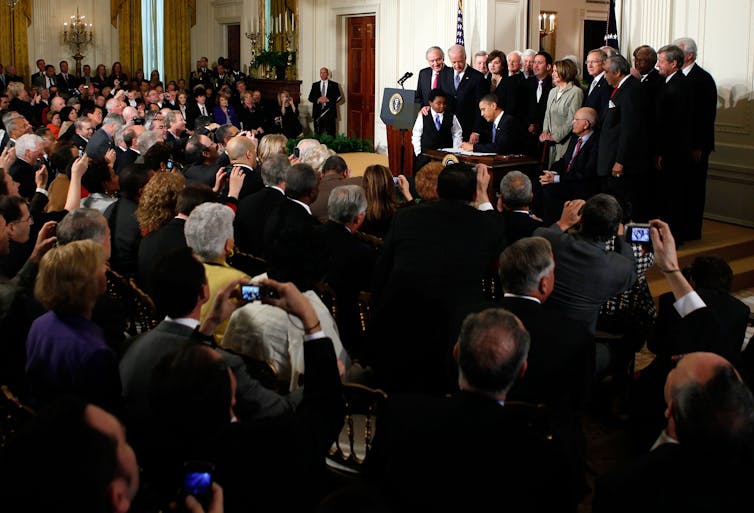
Experts in autocracies have pointed out that it is, unfortunately, easy to slip into normalizing the tyrant, hence it is important to hang on to outrage. These incidents which seem to call for the efforts of the Greek Furies (Erinyes) to come and deal with them will, I hope, help with that. As a reminder, though no one really knows how many there were supposed to be, the three names we have are Alecto, Megaera, and Tisiphone. These roughly translate as “unceasing,” “grudging,” and “vengeful destruction.”
I am very tired today and am not up for much thinking. So when I came across an article whose title is the song I have been singing since quite literally 1992. So I thoguht I would just share it.
================================================================
To achieve a new New Deal, Democrats must learn from the old one

Edwin Amenta, University of California, Irvine
As the United States reels from the COVID-19 pandemic and nationwide anti-racism protests, pundits from both sides of the political aisle have speculated that a new New Deal is in the offing.
It could happen. Crises, after all, often produce social policy gains, and the similarities between the 1930s and today are hard to ignore.
Unemployment has reached levels not seen since the 1930s, widening gaps in the social safety net. The infirm have been forced to work absent paid sick leave. The laid off have lost health coverage. And one in 5 households with young children faces food shortages.
Similarly, when Franklin D. Roosevelt took office unemployment was at 25% and the poverty rate among elderly citizens hovered over 70%. In 1932 World War I veterans demanding bonus payments were forcibly removed from Washington, D.C., by U.S. troops.
But these conditions don’t automatically result in progressive social policy. Britain muddled through the Depression without social reform, and Germany turned fascist and militaristic, for example.
As a sociology professor who has written extensively about U.S. social policy, I think Roosevelt’s New Deal teaches us that several developments have to coincide to generate a long-term social safety net.
Polls favor Democrats
First, public opinion has to shift drastically. In the 1930s, Gallup polls revealed strong support for government pensions for the elderly. Today public opinion has grown in favor of several social policy initiatives. About two-thirds of voters support a US$15 minimum wage, which was a minority view six years ago. A majority of Americans favor a single-payer health plan. That, too, was a minority view just a decade ago.
The crisis also has to unfold under the watch of a regime opposed to expanded social policies. Herbert Hoover opposed public relief – for the agricultural sector, the unemployed or the welfare state, in general – during the Depression. Instead, he ineffectively relied on mobilizing private efforts.
The Trump administration, likewise, has waged war on Obamacare. It wants a payroll tax cut, which would slash into Social Security and Medicare. And the Republican Senate opposes funding increases for food stamps and federal aid for states facing depleted budgets as a result of the coronavirus pandemic.
The public must also blame the crisis on the party in power and reject that party at the polls. The Republicans lost their congressional majority in 1930, and Hoover suffered a crushing defeat in 1932, with Roosevelt carrying many congressional Democrats on his coattails.
American voters have yet to decide on Trump and the Republicans, but early signs point to rejection. Trump’s approval rating remains well under water, while the popularity of most governors has skyrocketed. Trump trails Joe Biden by double digits in many presidential polls. Congressional ballots strongly favor Democrats. And Republican senators in Colorado, Arizona, North Carolina and Maine are in trouble, while their counterparts in Montana, Georgia, Kansas and Iowa seem vulnerable.
Longstanding political control
But three other things had to happen in the 1930s before New Deal reforms were implemented.
The first was a long-term shift in political control. Congress did not pass the Social Security and National Labor Relations Acts until Roosevelt’s third year in office. And Congress did not approve the Fair Labor Standards Act, which created the minimum wage, until his sixth year in office.
Roosevelt’s first two years were devoted largely to saving banks, encouraging industries to stabilize prices and wages and providing short-term poverty relief. If the Democrats had lost congressional support in 1934, major social reforms would have never seen the light.
Compare Roosevelt’s – and the Democrats’ – hold on power to former President Barack Obama’s, and the prerequisites for extensive reform become clear. Yes, Obama helped pass the Affordable Care Act, but he spent much of his early first term seeking passage of the Recovery Act to counter the Great Recession. He had to abandon potential labor and environmental reforms after losing congressional control for good in 2010.

By contrast, the New Deal reform wave was possible only after congressional elections in 1934 gave Democrats an overwhelming majority, putting legislative control in the hands of liberals. Roosevelt won in a larger landslide in 1936, and congressional Democrats expanded their majority. The Social Security Act was amended twice, and the program we know today was established in 1950, after Democrats had won the presidency for the fifth consecutive time.
Mass mobilization
New Deal reforms also relied on the mobilization of activists. The 2-million-strong Townsend Plan – with 8,000 clubs across the country – placed intense pressure on Congress. This group demanded universal retirement benefits, about $3,700 per month in today’s dollars. Workers struck for the right to bargain collectively. The unemployed organized and demanded benefits, too. Together, these efforts kept major reforms high on the political agenda.
Though unionization has witnessed steady declines for decades, the labor movement has enjoyed a sporadic resurgence of sorts recently, with major work stoppages – by United Auto Workers, United Teachers of Los Angeles and United Food and Commercial Workers – in the last couple of years. To implement major social policy changes, labor would need to remain active. The activists of Black Lives Matter movement would have to build on their nationwide protests and redouble organized efforts to transform police departments. And social policy would benefit from other reform-minded groups mobilizing as well.
Winning lasting social policy reform also required skillful policy crafting. The Social Security Act included taxes on payrolls and over time made its insurance program universal. Benefits for survivors and the disabled were slipped into the program’s coverage in 1939.
However, other programs were mishandled. Roosevelt depleted considerable political capital on the Works Progress Administration, a program to provide temporary work to the unemployed, which was permanently “discharged” after a conservative Congress was elected in 1942. That political capital might have been spent on lasting reform.
If the Democrats win the presidency and control of Congress, they will need to adopt and improve universal programs with solid foundations, like Social Security. They also need to avoid squandering political capital on short-term fixes. Some easy first moves would be to lower the age for Medicare eligibility to 60, as Joe Biden proposes, and end the wage ceiling on Social Security taxes, while permanently boosting benefits by $200 per month.
Most of programs in Obama’s Recovery Act were funded for only a year or two. Under new Democratic rule, grassroots groups – focused on environmental change, racial justice and gun safety, for example – will need to redouble organizing efforts to keep political leaders’ feet to the fire, lending urgency to public opinion for reform.
The lessons from the old New Deal suggest that a new one is possible. But Democrats will need to control Congress, policymakers will need to look beyond the current crises, and activists will need to keep the pressure on to establish lasting structural change.
[Like what you’ve read? Want more? Sign up for The Conversation’s daily newsletter.]![]()
Edwin Amenta, Professor of Sociology, University of California, Irvine
This article is republished from The Conversation under a Creative Commons license. Read the original article.
================================================================
Alecto, Megaera, and Tisiphone, It’s encouraging the more and pore people, and especially scholars, are coming aroung to realize what has always seemed so obvious to me. It will be even more encouraging if we can elect people who can and will act on it.
The Furies and I will be back.
7 Responses to “Everyday Erinyes #221”
Sorry, the comment form is closed at this time.

I pray every day that our Dems win the presidency!! in November and also hold onto Congress.
Yes, we need to stay the course with activism also. …..
Trump’s approval rating is similar to the brown stink bug, which is considered as an offensive species in gardens/outside. I’d vote for one of those bugs, over dt.
Excellent post, Joanne, Thank You !
Good stuff! My concern is, as mentioned, that the Dems do not focus on s/t changes, but l/term ones that wold build a new social structure.
We are still, sadly, as a culture, living in the venal legacy of J.C. Calhoun (Koch boys, e.g..):https://theconversation.com/authorities-are-yanking-the-legacy-of-slaveholder-john-c-calhoun-from-public-sphere-but-his-bigotry-remains-embedded-in-american-society-140917
Great job, JD!
I fully agree. However, the close quarters that such projects demand means they will have to wait until Trump* virus is contained.
In addition, we need to take the White House and win the Senate decisively to make it happen.
As Sanders and company have shown us, the money for much of it is in the defense budget. Thus to set the stage, Engel losing the primary and the House chair of the committee proposing defense budget provides the opportunity to get someone now who will not just rubber stamp endless increases for military-defense contractors like Ike warned about to set the stage.
Also, many current DEMs are happy with the inequality, et al (think Blue Dogs) so a DEM majority will not be enough if they are not progressive in their votes and proposed bills.
thanks…..
Good stuff, Joanne.
But as you say, while it is (perhaps blatantly) obvious to us, politicians of any denomination find it difficult to go for the long term instead of the quick fix that ensures their reelection. Working for the future demands vision and an understanding of society on many levels, things that don’t seem to come natural to politicians, especially not those who have a strong business background. So they need to work with those scholars you mentioned, and especially those who are as far divorced from politics as possible.
Let me qualify that a tiny bit – there are a few politicians who DO look at the long term and work for it. But they tend not to get RE-elected (unless they live in a very one-sided constituency). That’s how Colorado lost Mark Udall. (and to Cory Gardner, of all people.)